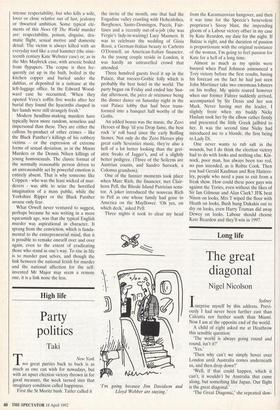Long life
The great
diagonal
Nigel Nicolson
Sydney
surprisesurprise myself by this address. Previ- ously I had never been further east than Calcutta nor further south than Miami. Now I am at the opposite end of the world.
A child of eight asked me at Heathrow this sensible question: 'The world is always going round and round, isn't it?'
'Yes.'
'Then why can't we simply hover over London until Australia comes underneath us, and then drop down?'
'Well, if that could happen, which it can't, it wouldn't be Australia that came along, but something like Japan. Our flight is the great diagonal.'
'The Great Diagonal,' she repeated slow- ly, as if the words had a magical sound.
I was flying business class, but hours and hours of flying, gobbling up the darkness and without a single stop till Singapore, is infinitely wearying. One is undertaking a journey that is the equivalent of Alexander the Great's, Marco Polo's and Captain Cook's joined end to end, and the body protests, though not at once.
Even in the intervals of daylight there was nothing to see except a vast duvet of fluffy clouds, until we crossed the Aus- tralian coast far west of Darwin. What sort of country can this be where you fly the first 2,000. miles without seeing a single house? Then the desert breaks into scrub, the scrub into canyon-split forest, the forest into fields and a neat array of suburbs 50 miles long. This is Sydney. The huge, untir- ing machine wheels over the harbour and you spot that pretty piece of Meccano and the group of broken egg-shells that stand for all Australia in the minds of those who have never been there.
Of course the harbour bridge is very remarkable and the opera house a tour-de- force, and they lie so close together that you can pose yourself for a picture against both as background. I took all this in, climbed the internal staircase of the opera house, which is as steep as the Eiger's north face, crossed the bridge several times, took the obligatory boat trip round the harbour, visited two museums, had lunch, had dinner, talked, laughed, walked, ran — and next day collapsed.
I had boasted to my Sydney friends that they need make no arrangements for my recovery from a 27-hour flight. let-lag', I explained, 'is all in the mind. If you think you will be exhausted, you will be exhaust- ed. If not, not.'
On that first day my boast seemed justi- fied. On the second, I bathed before break- fast and got ready for our expedition to the Blue Mountains. It was then that I sudden- ly discovered the meaning of disturbed metabolism: It means not just extreme tiredness but total indifference to food, friendship, sights and novelty, a loss of all sense of time and an irritability which nor- mally I would put low on my list of failings. I was led, protesting, to the lip of a canyon: to me it was just a stupid hollow in the ground. Taken to see the famous Three Sisters, pinnacles of rock, I remarked that freaks of nature, human or mineral, bored me. I was thoroughly unpleasant. When to my relief we arrived back in Sydney,e1 slept for 14 hours, and awoke restored.
They told me that flying the great diago- nal east to west produces less of a problem, though more of it is in darkness. You never catch up with the dawn. The Heathrow girl might have put another sensible question. Why is it less exhausting to ride against the rotation of the Earth than with it?



















































 Previous page
Previous page